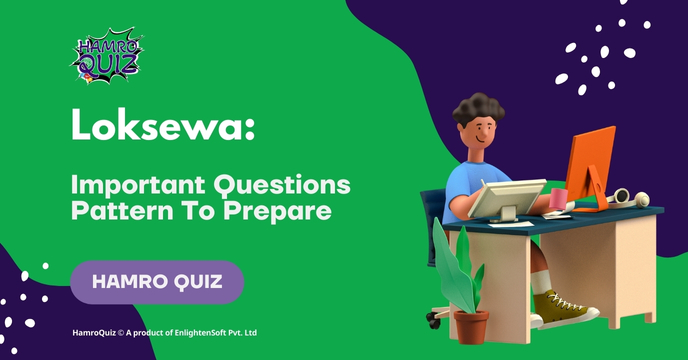
Loksewa Examination: Important Question Patterns to Prepare
Ready to Crack Loksewa Examination?
Are you preparing for the highly anticipated Loksewa examination? If so, you probably already know how important it is to prepare well for these highly competitive exams. In Nepal, the Loksewa examination, also called the Public Service Commission (PSC) exam, is the first step towards obtaining highly desired government jobs. Other than having in-depth knowledge, candidates must be aware of the exam format and be able to predict the kinds of questions that could be asked to ace these tests.
To help you prepare for the Loksewa examinations efficiently, we'll go over some important questions in this blog post covering various topics and subjects. Knowing the answers to these questions can greatly increase your chances of success, regardless of whether you're aspiring for teaching positions, administrative roles, or any other government job.
Understanding the Loksewa Examination Structure
Let's take a brief look at the Loksewa exam structure before getting into particular questions. These tests usually contain multiple-choice questions (MCQs) covering areas particular to the position you are applying for as well as general knowledge, mathematics, and English language. To evaluate candidates' writing and analytical abilities, there might also be descriptive portions.
Key Areas to Focus On
General Knowledge:
- Constitutional/History Knowledge:
- Who was the Prime Minister of Nepal during the Kotparwa Festival?
- Who is known as the Living Martyr?
- Who is the King of Nepal who first visited Europe?
- When was the National Assembly election held?
- Who is appointed the Attorney General of Nepal from a law person?
- When was the Public Service Commission named as a ‘Loksewa Aayog’?
- Who was awarded the Madan Prize for 2073?
- Who is currently the Chairman of the Public Service?
- How old was Jung Bahadur Rana when he was Prime Minister?
- Which Rana Prime Minister initiated the use of Khadak Dent Impressions?
- Current Affairs:
- How many MW of electricity has been produced in Nepal so far?
- How many trade points have been opened between Nepal and India?
- What is the number of United Nations member states currently?
- How many national pride projects are there in Nepal right now?
- Geography:
- Which is the famous district for coffee farming?
- Which is the famous district for textiles in Dhaka?
- In which district is Nand Bhauju Lake located?
- Which is Nepal’s first WiFi Free District?
- Which mountain is known as the White Mountain?
- In which district does Dipendra Shikhar fall?
- In which district does the ‘Fung Fung Fall?
- Which district is known as the district of the Seven Lakes?
- In which district does Turature Lake fall?
- Which is the famous district for ginger farming?
- Which district lies the northernmost point of Nepal?
- Which is the headquarters of Nepal at the lowest altitude?
- How many hight located is Muktinath?
- Which district refers to the district of Lokta and the district of the suspension bridge?
- What century is known in geographical history as the “New Era?”
- Culture:
- What is called the Tharu caste the ‘Ghar-Jwai’ in tradition?
- By what name is the Bhandarkal festival known?
- Which caste celebrates the festival of ‘Siruwa’?
- Which caste celebrates the Gaura festival?
- Which is the longest-running ‘Jatra’ in Nepal?
- In which caste is the custom of marrying the head collide of the bride and groom three times?
- In which caste is the ‘Putpute dance’ prevalent?
- Worldwide:
- Who was the inventor of penicillin?
- Who is the Exponent of the Sun-Centered Principle?
- Which country is women more literate than men?
- What is the country that does not raise the flag in national mourning?
- Which country in the world does not have its soldiers?
- Which is currently the most populous city in the world?
- Who is the inventor of the radio?
- Which river in the world does not have fish?
- Which country is known as the climatic country of South America?
- Which country is known as the ‘Buffer Zone of Europe’?
- Which city is known as the ‘Queen of the South’?
- Which continent is also known as the ‘Last of Lands’?
- Which country is the sunrise at midnight?
- What is the full form of NATO?
- Which country is known as the Land of the Lilies?
- Which country is the largest cotton-producing country in the world?
Mathematics:
- Arithmetic:
- Solve problems involving percentages, fractions, and decimals.
- Calculate compound interest and simple interest for a given principal, rate, and time.
- Interpret and analyze data presented in tables, graphs, and charts.
- Algebra and Geometry:
- Solve linear equations and inequalities.
- Calculate the area and perimeter of geometric shapes such as triangles, rectangles, and circles.
- Apply the Pythagorean theorem to solve problems involving right triangles.
- Statistics and Probability:
- Calculate measures of central tendency (mean, median, mode) for a given dataset.
- Determine the probability of simple and compound events.
- Interpret statistical data to draw conclusions and make predictions.
English Language:
- Grammar and Usage:
- Correct errors in sentences involving subject-verb agreement, tense consistency, and sentence structure.
- Differentiate between commonly confused words such as 'their/there/they're' and 'your/you're.'
- Identify and correct grammatical mistakes in passages provided.
- Reading Comprehension:
- Analyze and interpret passages from various genres, including fiction, non-fiction, and informational texts.
- Answer questions based on the main idea, supporting details, and author's purpose.
- Draw inferences and make predictions based on textual evidence.
- Writing Skills:
- Write a persuasive essay on a given topic, presenting arguments supported by relevant examples and evidence.
- Compose a formal letter or email addressing a specific audience and purpose.
- Summarize and paraphrase information from a passage while maintaining clarity and coherence.
Importance of Strategic Preparation
Mastering these questions alone won't guarantee success as these are just a few questions and what type of question you need to focus on. Students must be consistent and prepare strategically for success. Here are some tips to enhance your preparation:
- Practice Regularly: Allocate enough time to practice mock examinations and past year's question papers, to get used to the structure and timing of the assessment.
- Stay Up to date: Remain updated on the most recent changes, government policies, and activities in the fields that draw your interest most.
- Seek Guidance: Enrolling in coaching programs or reliable internet resources might help you prepare for the Loksewa exam.
- Review and Revise: Practice and revise the subjects you believe you are poor in regularly.
You can do it!
Cracking Loksewa exams requires a combination of subject knowledge, critical thinking skills, and effective exam strategy. By incorporating these vital questions into your preparation regimen and following the recommended tips, you'll be better equipped to tackle the challenges posed by these competitive examinations. Remember, perseverance and dedication are the keys to achieving your goal of securing a prestigious government position through Loksewa.
Best of luck!
